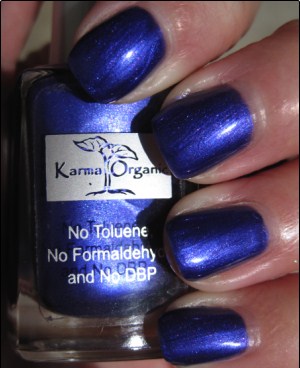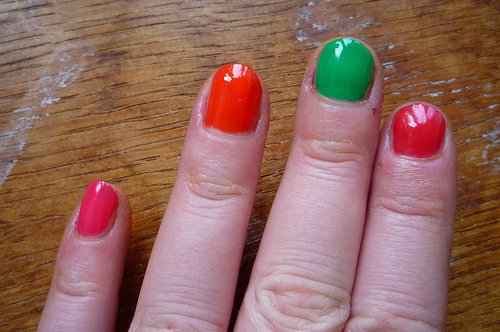Natural and Organic Nail Polishes Benefit Health
 December 23, 2010
December 23, 2010  Kyriaki (Sandy) Venetis
Kyriaki (Sandy) Venetis  Photo courtesy of Oprah.com
Photo courtesy of Oprah.com
Wearing nail polish is a great way to bump up any look, whether you’re going for sophistication, playfulness, vintage, Goth, or anything in between. Along with more colors to choose from, there are more brands than ever before, ranging from convention to many newer healthier natural and organic-based products.
Conventional Nail Polishes
Conventional nail polishes are generally cheaper, but they are also filled with health concerns for wearers, especially those with allergies, chemical-sensitivities, pregnant women, and children.
All convention nail polishes contain a number of toxic chemicals that most notably include formaldehyde, toluene, and dibutyl phthalate.
Formaldehyde is used in many polishes as a nail hardner, but it’s also a known human carcinogen, according to the National Cancer Institute.
“When formaldehyde is present in the air at levels exceeding 0.1 parts per million, some individuals may experience adverse effects such as watery eyes; burning sensations in the eyes, nose, and throat; coughing; wheezing; nausea; and skin irritation. Some people are very sensitive to formaldehyde, whereas others have no reaction to the same level of exposure,” added the institute.
Toluene is a solvent that gives nail polishes a fluid quality and speeds up drying time, but also has its own concerns. The Agency for Toxic Substances and Disease Registry (ATSDR) says that, “Low to moderate levels can cause tiredness, confusion, weakness, drunken-type actions, memory loss, nausea, loss of appetite, and hearing and color vision loss. These symptoms usually disappear when exposure is stopped.”
For pregnant women, the ATSDR added that, “We do not know if toluene harms the unborn child if the mother is exposed to low levels of toluene during pregnancy,” but “breathing very high levels of toluene during pregnancy can result in children with birth defects and retard mental abilities and growth.”
Dibutyl phthalate (more commonly known as DBPs) are plasticizers which serve to make nail polish more fluid and workable as well as more durable, and resistant to elements that the wearer may come in contact with during the day, such as soap, water, and oils.
DBPs also have serious health concerns. The U.S. Department of Labor’s ‘Occupational Safety and Health Guideline for Dibutyl Phthalate,’ says that, “Symptoms of chronic exposure to mixtures of dibutyl phthalate and other esters include pain, numbness and spasms in the upper and lower extremities, followed by weakness of the upper and lower extremities.
“Women workers exposed to phthalates have been reported to have more menstrual disorders, miscarriages, reduced gestation and delivery rates than controls.”
As far as cosmetics, the department’s guidelines found that, “Responses to cosmetic formulations containing up to 9 percent DBP ranged from nonirritating to slightly irritating in various patch test procedures.”
The Environmental Working Group also published a report in 2000 which found that, “DBP causes a number of birth defects in lab animals, primarily to male offspring, including testicular atrophy, reduced sperm count, and defects in the structure of the penis.”
The EWG recommends that, “Women who are pregnant, nursing, or thinking about getting pregnant should look for and avoid all personal care products with the word phthalate on the label. Some common forms of phthalates in personal care products are dibutyl phthalate, diethyl phthalate, and dimethyl phthalate.
“If you use nail products, choose those that contain fewer toxins. Use products free of DBP and other common nail polish toxins like toluene and formaldehyde.”
Natural and Organic Nail Polishes
 Photo courtesy of Karma Organic Spa.
Photo courtesy of Karma Organic Spa.
Today, great alternatives to toxin-filled conventional products are water-based natural and organic nail polishes. They use ingredients derived from nature to perform the same functions as laboratory synthesized chemicals without the potential health consequences.
If an ingredient is labeled organic, it must conform to certain criteria that meet the U.S. Department of Agriculture’s National Organic Program certification, including:
- Three years with no application of prohibited materials (no synthetic fertilizers or pesticides) prior to the harvest of the first certified organic crop.
- Use of organic seeds, when commercially available.
- No commingling or contaminating of organic products during processing.
The USDA says for a product label to say “100 percent organic,” it must be exactly that. To say “organic,” it must contain at least 95 percent organic ingredients. To say “made with organic ingredients,” it must contain at least 70 percent organic ingredients. For less than 70 percent, a product label can’t make organic claims, but can list the organic ingredients on the ingredients label.
Always be wary about organic advertising claims and check the ingreidents labels. And, while there are a lot of great natural nail polish makers out there, two of the most notable are: Suncoat Products Inc. and Karma Organic Spa.
 Suncoat natural nail polishes. Photo courtesy of Libertylondongirl.com
Suncoat natural nail polishes. Photo courtesy of Libertylondongirl.com
Both maker list the ingredients of their nail polishes on their websites, and Suncoat’s nail polish was honored for two consecutive years at the Canada Health Food Association Expo, winning the Silver medals of the Alive Award of Excellence in 2004 and 2005.
Regardless of what nail polish color and brand you choose, always look at the ingredients list so you can stay healthy as well as beautiful. Also, always try and choose a natural nail polish remover as well. Makers of natural nail polishes always have corresponding natural nail polish removers.
Reader comments and input are always welcomed!

Reader Comments